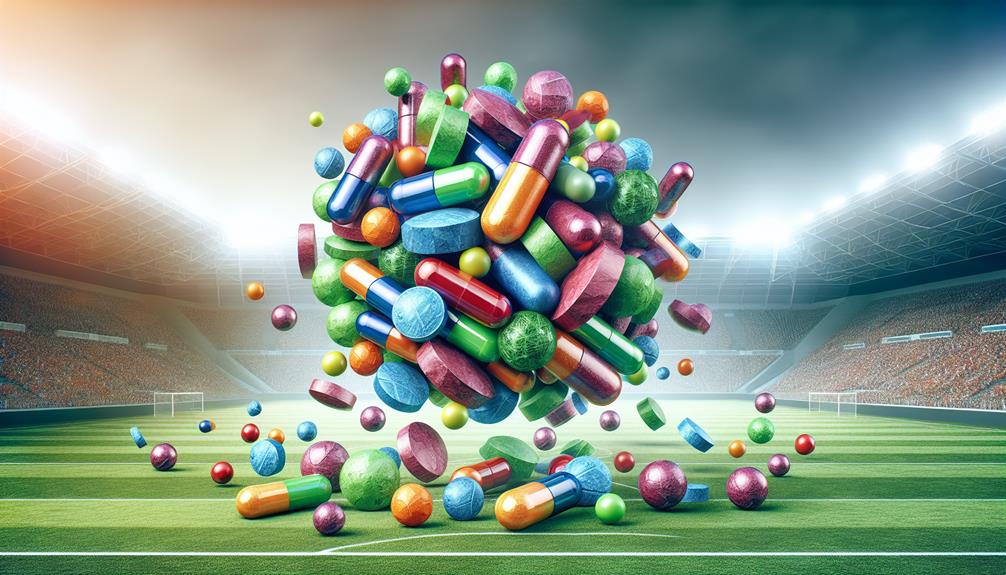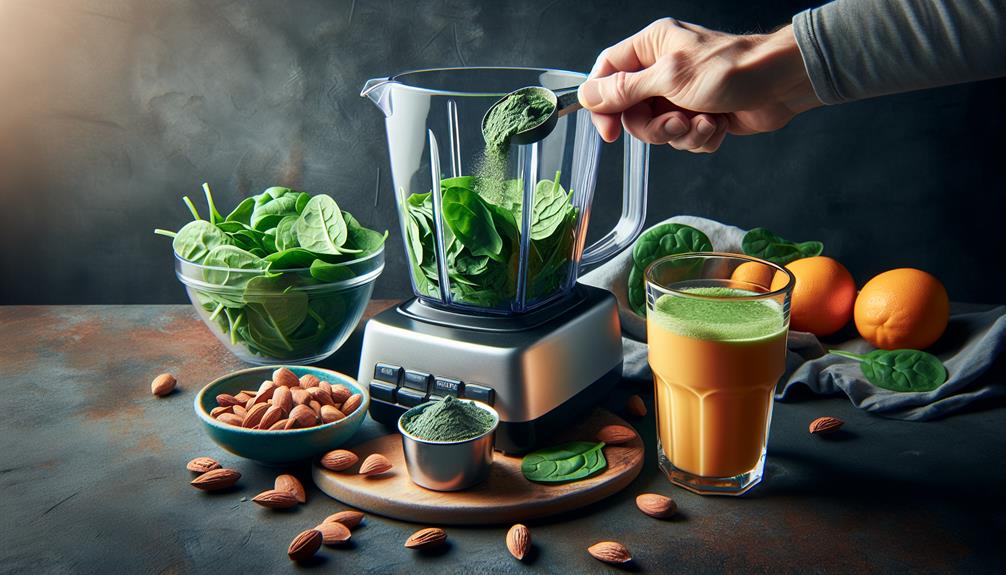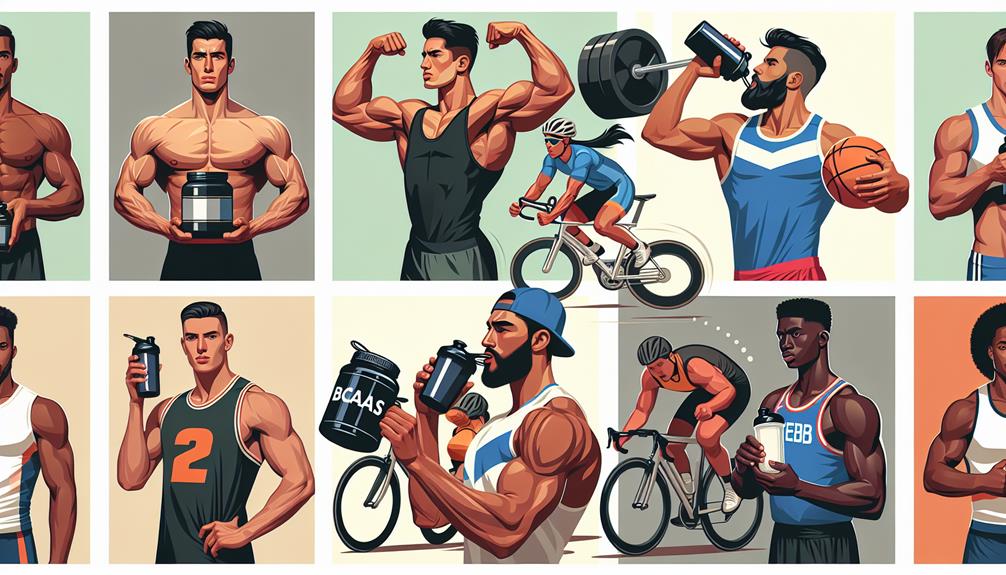You might think that to excel in your athletic pursuits, you simply need to train hard and eat well, but there's a crucial element you might be missing.
Let's explore the world of essential supplements for athletes and uncover the key components that could potentially take your performance to the next level.
From muscle recovery to immune support and cognitive function, these supplements have a lot to offer. So, why not discover how they could benefit you and your athletic journey?
Key Takeaways
- Vitamin D crucial for muscle strength, immune health, and injury prevention
- Iron essential for metabolism, oxygen transport, and preventing fatigue
- Monitoring micronutrient deficiencies vital for optimal athletic performance
- Supplementing with 1000-2000 IU of vitamin D daily is recommended
Importance of Vitamin and Mineral Supplements
Ensuring adequate intake of essential vitamins and minerals is vital for athletes to optimize their performance and recovery. Athletes have increased nutritional demands due to their intense physical training. Vitamin and mineral supplements play a crucial role in meeting these requirements, helping athletes avoid deficiencies that can hinder athletic performance and recovery.
Vitamin D is especially important for athletes as it supports muscle function and boosts immune health, essential for overall performance. Adequate vitamin D levels can improve muscle strength and coordination, key factors for athletes aiming to excel in their sport.
On the other hand, iron is a vital mineral for athletes, particularly crucial for menstruating females, as it helps prevent fatigue and supports optimal metabolism. Iron deficiency can lead to decreased endurance and overall performance, making it essential for athletes to monitor their iron intake to maintain peak physical condition.
Key Vitamins for Athletic Performance
To enhance your athletic performance, focusing on key vitamins is essential for optimizing your physical capabilities and overall health.
Vitamin D is crucial for athletes as it directly impacts muscle size, strength, and power. Aim for a daily intake of 1000-2000 IU to support immune health and aid in quicker recovery post-exercise. Research indicates that a significant percentage of athletes suffer from Vitamin D deficiencies, which can lead to low testosterone levels and increase the risk of injuries.
This vitamin plays a vital role in muscle function and metabolism, making it a cornerstone for athletes striving for peak performance. Adequate levels of Vitamin D are associated with improved muscle function, highlighting the importance of supplementation for optimal athletic performance.
Ensure you meet the daily recommended intake to unlock the full potential of your physical abilities and reduce the risk of performance-hindering deficiencies.
Essential Minerals for Athletes

Crucial for optimal athletic performance, essential minerals play a vital role in supporting various physiological functions in athletes.
Iron, essential for athletes, particularly menstruating females, supports metabolism, oxygen transport, and prevents iron-deficiency anemia.
Calcium is crucial for bone production and maintenance, benefiting endurance athletes and those susceptible to injury.
Phosphate is indispensable for anatomical processes, aiding in stress management and overall recovery in athletes.
Potassium, vital for muscle recovery, can be obtained from a variety of foods and supplements to sustain peak performance.
Micronutrient deficiencies must be monitored and addressed in athletes to ensure optimal health, performance, and recovery.
By ensuring adequate intake of these essential minerals, athletes can enhance their performance, support their bodies' functions, and maintain overall well-being.
Benefits of Vitamin D for Athletes
As athletes strive for peak performance, one essential element that often goes unnoticed is the significant impact of Vitamin D on their muscle size, strength, and power. Vitamin D deficiency affects 26-36% of athletes and can lead to decreased muscle function, low testosterone levels, and a higher risk of injuries. Adequate vitamin D intake is crucial for optimal muscle function and overall athletic performance. Supplementing with 1000-2000 IU of vitamin D per day is recommended to maintain adequate levels.
Additionally, vitamin D plays a vital role in supporting immune health, enhancing recovery, and promoting muscle size in athletes. Ensuring sufficient vitamin D levels not only boosts athletic performance but also aids in reducing the risk of injuries and optimizing overall health. Prioritizing vitamin D intake can be a game-changer for athletes looking to maximize their potential on and off the field.
Iron and Its Role in Performance

Iron's role in enhancing athletic performance can't be overstated, as it directly impacts metabolism, oxygen transport, and muscle function. Adequate iron levels are crucial for athletes as iron supports muscle size, strength, power, and helps prevent iron-deficiency anemia.
Deficiencies in iron can lead to fatigue, decreased performance, and an increased risk of iron-deficiency anemia, particularly affecting menstruating female athletes due to blood loss during menstruation. To maintain optimal performance and recovery, iron supplementation may be necessary for athletes with low iron levels.
Ensuring sufficient iron intake is essential for athletes looking to optimize their performance, as it plays a vital role in overall metabolic function, oxygen delivery to muscles, and proper muscle function. Paying attention to iron levels and addressing any deficiencies promptly can significantly benefit athletic performance and overall well-being.
Frequently Asked Questions
What Are Supplements Athletes Should Take?
You should consider creatine, beta-alanine, caffeine, protein powder, and vitamin D. These supplements can enhance your body composition, strength, exercise performance, endurance, muscle growth, and overall performance. Make sure to follow recommended daily intake guidelines.
What Should an Athlete Consider When Evaluating a Supplement?
When evaluating a supplement, consider ingredients, dosage, and benefits for your athletic goals. Look for scientific evidence, certifications like NSF, and potential risks. Consult with a healthcare provider to ensure suitability for your needs.
Do Elite Athletes Take Supplements?
Yes, elite athletes commonly take supplements to enhance performance. These supplements can provide crucial nutrients, improve recovery, and support training goals. It's essential to choose supplements wisely and consult with professionals for personalized advice.
Do Athletes Need to Take Extra Supplements of Vitamins and Minerals?
You need to consider taking extra supplements of vitamins and minerals as an athlete. Deficiencies can affect your performance. Professional guidance can help determine your specific needs. Adjusting intake based on monitoring can optimize health and results.
Conclusion
In conclusion, incorporating essential supplements like vitamins, minerals, and protein into your diet can greatly benefit your athletic performance and overall health. By ensuring you're meeting your body's nutritional needs, you can support muscle recovery, boost immune function, and enhance your cognitive abilities.
Remember to consult with a healthcare provider to personalize your supplementation plan and optimize your athletic performance. Stay strong, stay healthy, and keep pushing yourself to new heights!
I’m not just a supplement analyst. I’m an extremely qualified one! I am a Certified Nutrition Coach (CNC) and actually received my certification directly from the National Academy of Sports Medicine. I am also a Nutrition & Wellness Consultant, certified by the American Fitness Professionals Association (AFPA).


